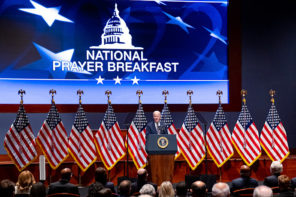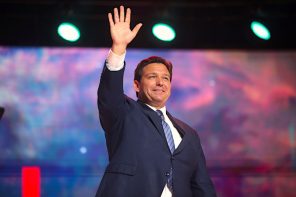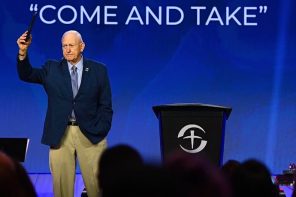If a blogger could fire up the Google machine and discover that Louie Giglio said, about 15 years ago, that the gay rights movement is one that seeks “to seize by any means necessary the feeling and the mood of the day, to the point where the homosexual lifestyle becomes accepted as a norm in our society and is given full standing as any other lifestyle,” why couldn’t the White House?
The entire sequence—from the Inaugural Committee’s announcement that Giglio would be delivering the benediction, to the Think Progress post, to Giglio’s letter withdrawing—was over in a flash. In that flash, we learned that Giglio didn’t really seem to see anything fundamentally wrong with his decade-and-half-old sermon. In fact, he really seems to still believe that the “agenda” (his word, not mine) is a selfish, self-serving one, a movement that would seek to “dwarf” (again, his word, not mine) his godly inaugural message.
Why, exactly, does Obama have this problem? Can’t he find an LGBT-affirming clergy, or at least someone who doesn’t have an online trove of sermons denouncing sexual sin, or, barring that, someone who has repented from homophobia, to put it in religious terms?
The answer is, of course, all those options are available to him (and many observers, including the Washington Monthly’s Ed Kilgore, have started making suggestions for Giglio replacements). Recall 2009, when Obama was faced with opposition to his selection of Rick Warren to deliver the inaugural invocation. Obama tapped Gene Robinson to deliver the invocation at a concert. Why it wasn’t the other way around was also a question raised at the time.* But it’s really not the point. The point is that Obama thought that Warren was worthy, just as he thought Giglio was worthy four years later.
In Warren’s case, the offending statements had recently been in the news, so there was no question Obama and his advisors knew about them. By contrast, Giglio is known in more recent times for his “passion” conferences, urging a spiritual awakening among America’s youth, and his work combatting human trafficking. Perhaps Obama and his advisors thought this sufficient, and didn’t think that Googling “‘Louie Giglio’ and homosexuality” was in order. Perhaps Obama’s advisors thought that Giglio was a great guy, and admired his work, as the administration embarked on an initiative to combat human trafficking.
As I wrote yesterday, Giglio—as he acknowledged in his letter today—has already met and befriended the president. White House visitor logs show he has been to 1600 Pennsylvania Avenue at least twice, and he prayed at Obama’s Easter Prayer Breakfast last year. Perhaps the pair, in the obviously brief encounters they’ve had, never had a chance to discuss the gay “agenda.”
Conservative evangelicals—although there are still many willing to wage the culture wars unabashedly—see that they need to “broaden” their agenda to include issues other than the combatting homosexuality and abortion. Giglio, whose conferences draw tens of thousands of attendees, is an example of an evangelical who has taken on another issue, in his case human trafficking. It’s his trademark now, something that distinguishes him from, say, the American Family Association’s Bryan Fischer. But as this morning’s letter made clear, Giglio hasn’t abandoned his previously expressed views on homosexuality, he merely has chosen not to amplify them.
In this sense, the White House has done us a huge favor. It has, apparently inadvertently, drawn the curtain back on at least one religious activist it has felt so compelled to appeal to, in part to win votes (although that didn’t appear to be either helpful or necessary), and in part to appear welcoming even to Obama’s conservative critics (a trait some people laud and others see as a character flaw). We know, though, that when someone is praised for their religiously-motivated work in an area one might agree with them on (combatting human trafficking) it is quite possible one might find other things to offend in the person’s past (or present). Not that that should be fatal to, say, building coalitions for a common cause, but it can be poisonous when the person is called upon to perform a task that should be inclusive of all the country’s citizens.
The Democrats have gone through a period—roughly 2005 to the present—during which they received a lot of unsolicited advice about how they should make nice with conservative religious activists. In her 2008 book, The Party Faithful, Amy Sullivan scolded Terry McAuliffe, then the chair of the Democratic National Committee, for his failure to even know who Rick Warren was. “Most Democratic operatives, however, were oblivious to the existence of evangelical culture,” she wrote, although surely they were not oblivious to the ways evangelical culture was hostile to their political aspirations. “The few who weren’t would have been hard-pressed to identify the personalities within it.” Four years later, though, Warren was rendered politically irrelevant when both the Obama and Romney campaigns declined an invitation to a redux of his 2008 presidential forum. Warren then claimed the cancellation was his own choice because of the “uncivil discourse” of the campaigns.
Conservatives are already starting to protest that the complaints about Giglio were a mark of the intolerance of progressives for their conservative Christian views. “How is this substantially different from the Inquisition?” tweeted Brandon McGinley, a conservative activist. (Let me count the ways.)
Naturally there’s no religious figure that no one would object to. Perhaps one solution would be to have multiple figures pray together in an interfaith way, or to abandon inaugural prayer altogether. (I can see my inbox filling up as I write those last four words.) It’s hard to make it inclusive, and historically, the praying business has been a no-win for Obama. Even when he tries to pray like an evangelical, Obama is castigated, as he was last year following the National Prayer Breakfast, when he was mocked for his “phony religiosity.”
Obama, though, let that roll right off his back. By contrast, conservatives are starting to portray Giglio as a victim. Which is, of course, another sign that the culture wars are not over.
*This post has been corrected to reflect Robinson’s role in the 2009 inaugural festivities.




